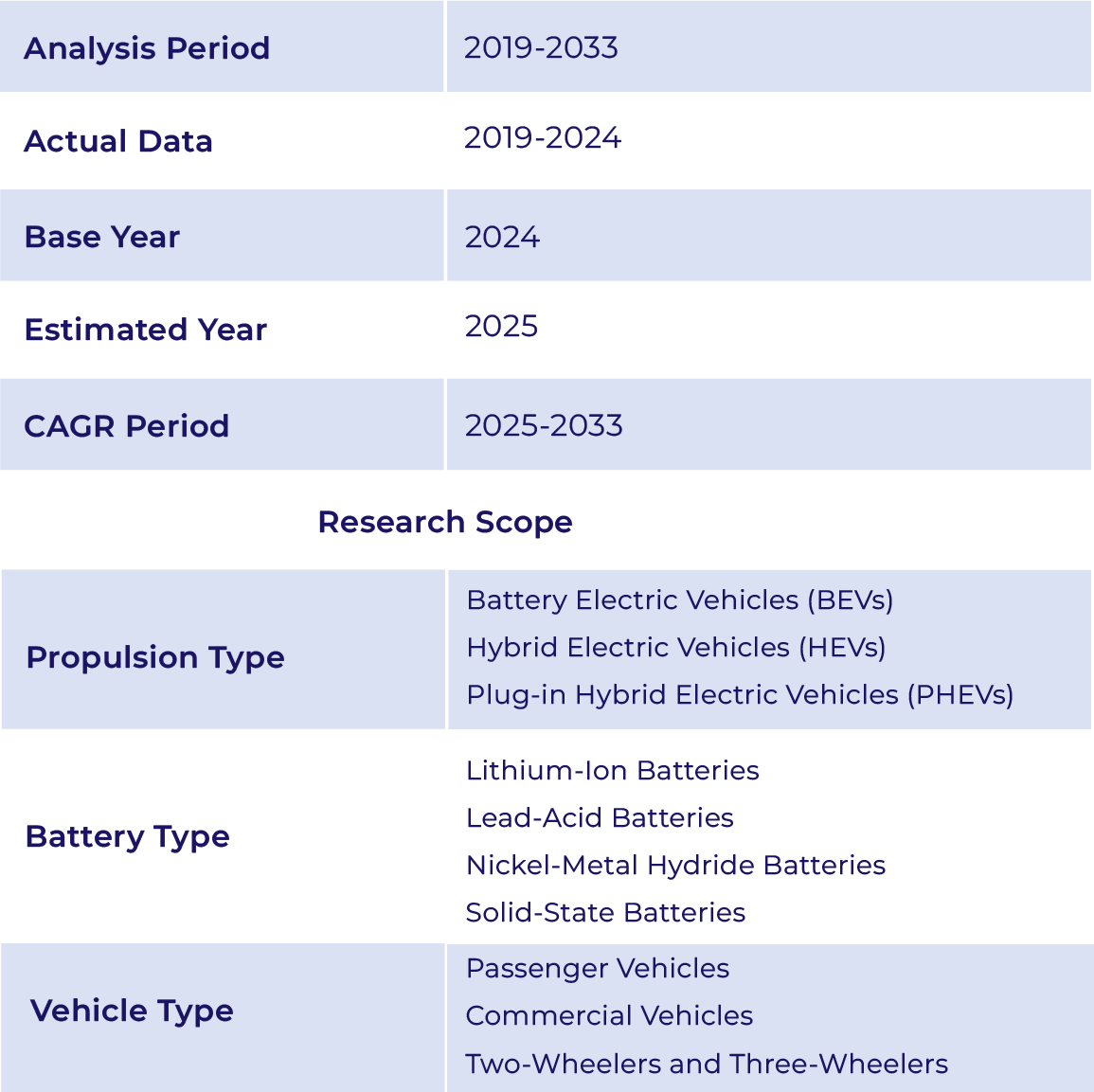Germany Electric Vehicle Battery Market Growth and Performance
- In 2023, the Germany EV battery market size expanded to US$ XX Million, recording XX% annual growth.
- The spending on electric vehicle battery market in Germany is expected to show a CAGR of XX% during the forecast period (2025-2033) to reach US$ XX Million by 2033.
Germany Electric Vehicle Battery Market Outlook
The Germany EV battery Market is entering a transformative phase, driven by rapid electrification, supportive policy frameworks, and technological innovation. As the country accelerates its shift towards sustainable transportation, demand for high-performance EV batteries continues to soar. Germany’s ambition to become Europe’s EV battery production powerhouse is backed by substantial public and private investment. The government’s €15 billion initiative to fund battery-cell manufacturing and ecosystem development by 2030 is setting the pace for this transition.Innovative research initiatives, such as the ENTISE project launched in October 2024, underscore the country’s commitment to diversifying battery technologies. This project focuses on industrial-scale sodium-ion batteries, offering an alternative to conventional lithium-ion systems. Meanwhile, digitalization and AI-driven battery management systems are enhancing battery performance, safety, and longevity.
Germany central location and advanced manufacturing infrastructure position it as a strategic hub in the global EV battery value chain. Collaboration between automakers, technology companies, and research institutions is fostering a robust and integrated ecosystem. As the market matures, the Germany Electric Vehicle Battery Industry is expected to become a global benchmark in terms of innovation, scalability, and sustainability. With increasing investments in R&D and cross-border supply agreements, the Germany Electric Vehicle Battery Market Growth is poised to remain strong through the decade.
Germany Electric Vehicle Battery Market Drivers
A confluence of strategic government initiatives, heightened environmental imperatives, and continuous technological advancements is actively accelerating Germany Electric Vehicle Battery Market Growth. Central to this growth is Germany's strategic investment in domestic battery production. In May 2022, the German government announced €155.4 million in funding to Northvolt to build a large-scale EV battery-cell plant, aligning with national goals to develop a self-reliant battery ecosystem and reduce foreign dependency.Automotive industry leaders are also proactively investing to secure long-term raw material supply chains. A prime example is Volkswagen’s $48 million investment in Patriot Battery Metals, securing a decade-long spodumene concentrate supply for its battery subsidiary, PowerCo. This move supports its gigafactory operations and strengthens upstream integration.
On the consumer front, increasing awareness of carbon emissions and the transition to zero-emission vehicles is boosting demand for greener, longer-lasting batteries. Companies like Clarios are advancing energy-efficient battery solutions to meet evolving performance expectations and sustainability goals.Furthermore, the integration of EV-grade batteries into renewable energy storage systems is expanding market opportunities beyond mobility. Coupled with incentives for EV adoption and innovation funding, these factors are establishing Germany as a global leader in battery technology and sustainability. The convergence of policy, investment, and innovation continues to drive the Germany electric vehicle battery industry forward.
Germany Electric Vehicle Battery Industry Trends
The Germany electric vehicle battery industry is witnessing a wave of transformative trends that are redefining battery design, production, and lifecycle management. One of the most pivotal developments is the shift toward alternative battery chemistries. The ENTISE project, a government-backed initiative launched in October 2024 and led by Varta, is focused on industrial-scale development of sodium-ion batteries. This three-year program represents a critical step toward safer, cost-effective, and resource-abundant battery technologies. Another major trend is the emphasis on circular economy models. As environmental regulations tighten and the need for resource efficiency grows, battery recycling is becoming a cornerstone of market strategy. German firms and global players are investing heavily in recycling infrastructure, enabling the recovery of critical materials like lithium, cobalt, and nickel for reuse in battery production.
Digitization also plays a transformative role, with AI and IoT technologies enabling advanced battery diagnostics, predictive maintenance, and energy optimization. These intelligent systems not only extend battery life but also enhance safety and performance across applications.Strategic partnerships and cross-border collaborations are accelerating innovation. Automakers are teaming up with research institutions and startups to pioneer next-generation solutions. Collectively, these trends are reinforcing the Germany electric vehicle battery market role as a catalyst for Europe’s sustainable energy transition.
Germany Electric Vehicle Battery Market Industry Development
The Germany Electric Vehicle Battery Market has seen remarkable advancements in technology, testing capabilities, and investment activity, positioning it at the forefront of the European battery revolution. A notable recent development is the May 2024 acquisition of BatterieIngenieure GmbH by UL Solutions Inc. This Aachen-based company specializes in performance testing for cells and battery systems used in electric vehicles. The acquisition not only expands UL’s global testing infrastructure but also strengthens Germany’s role in battery safety and validation standards. BatterieIngenieure is also building a larger laboratory in Aachen to meet growing demand. Simultaneously, innovation in battery chemistry is receiving strong institutional backing. The ENTISE project continues to drive sodium-ion battery research, involving 15 top-tier universities and companies and supported by €7.5 million in public funding.
Automakers and battery manufacturers are also ramping up vertical integration. Volkswagen’s strategic partnership with Patriot Battery Metals ensures stable raw material sourcing, while PowerCo’s gigafactory plans solidify Germany’s role in the global EV supply chain. Meanwhile, sustainability-focused firms like Clarios are launching new technologies that enhance battery recyclability and energy efficiency. These advancements are addressing both regulatory pressures and market expectations for environmentally responsible solutions.
Germany Electric Vehicle Battery Market Scope







